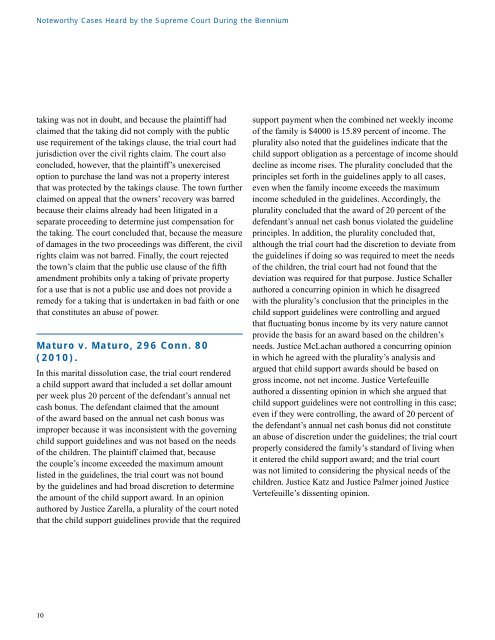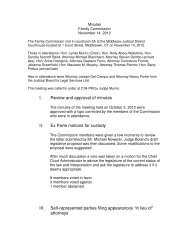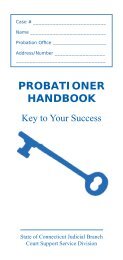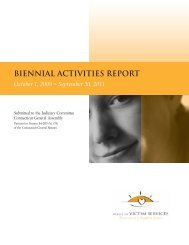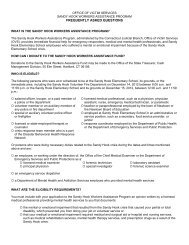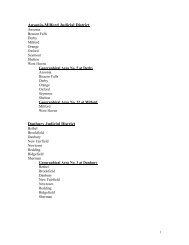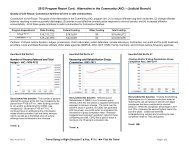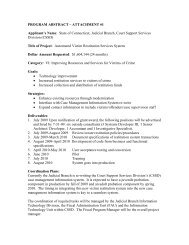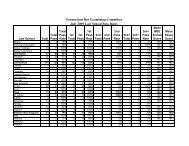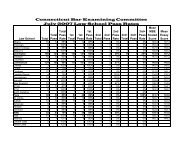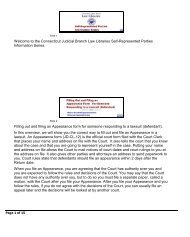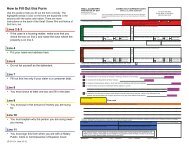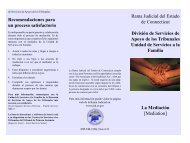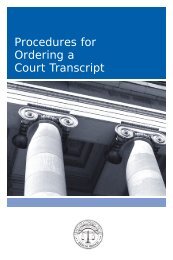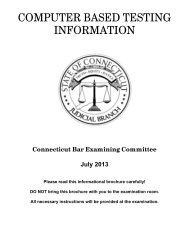Biennial Report, 2008-2010 - Connecticut Judicial Branch - CT.gov
Biennial Report, 2008-2010 - Connecticut Judicial Branch - CT.gov
Biennial Report, 2008-2010 - Connecticut Judicial Branch - CT.gov
Create successful ePaper yourself
Turn your PDF publications into a flip-book with our unique Google optimized e-Paper software.
Noteworthy Cases Heard by the Supreme Court During the Biennium<br />
taking was not in doubt, and because the plaintiff had<br />
claimed that the taking did not comply with the public<br />
use requirement of the takings clause, the trial court had<br />
jurisdiction over the civil rights claim. The court also<br />
concluded, however, that the plaintiff’s unexercised<br />
option to purchase the land was not a property interest<br />
that was protected by the takings clause. The town further<br />
claimed on appeal that the owners’ recovery was barred<br />
because their claims already had been litigated in a<br />
separate proceeding to determine just compensation for<br />
the taking. The court concluded that, because the measure<br />
of damages in the two proceedings was different, the civil<br />
rights claim was not barred. Finally, the court rejected<br />
the town’s claim that the public use clause of the fifth<br />
amendment prohibits only a taking of private property<br />
for a use that is not a public use and does not provide a<br />
remedy for a taking that is undertaken in bad faith or one<br />
that constitutes an abuse of power.<br />
Maturo v. Maturo, 296 Conn. 80<br />
(<strong>2010</strong>).<br />
In this marital dissolution case, the trial court rendered<br />
a child support award that included a set dollar amount<br />
per week plus 20 percent of the defendant’s annual net<br />
cash bonus. The defendant claimed that the amount<br />
of the award based on the annual net cash bonus was<br />
improper because it was inconsistent with the <strong>gov</strong>erning<br />
child support guidelines and was not based on the needs<br />
of the children. The plaintiff claimed that, because<br />
the couple’s income exceeded the maximum amount<br />
listed in the guidelines, the trial court was not bound<br />
by the guidelines and had broad discretion to determine<br />
the amount of the child support award. In an opinion<br />
authored by Justice Zarella, a plurality of the court noted<br />
that the child support guidelines provide that the required<br />
support payment when the combined net weekly income<br />
of the family is $4000 is 15.89 percent of income. The<br />
plurality also noted that the guidelines indicate that the<br />
child support obligation as a percentage of income should<br />
decline as income rises. The plurality concluded that the<br />
principles set forth in the guidelines apply to all cases,<br />
even when the family income exceeds the maximum<br />
income scheduled in the guidelines. Accordingly, the<br />
plurality concluded that the award of 20 percent of the<br />
defendant’s annual net cash bonus violated the guideline<br />
principles. In addition, the plurality concluded that,<br />
although the trial court had the discretion to deviate from<br />
the guidelines if doing so was required to meet the needs<br />
of the children, the trial court had not found that the<br />
deviation was required for that purpose. Justice Schaller<br />
authored a concurring opinion in which he disagreed<br />
with the plurality’s conclusion that the principles in the<br />
child support guidelines were controlling and argued<br />
that fluctuating bonus income by its very nature cannot<br />
provide the basis for an award based on the children’s<br />
needs. Justice McLachan authored a concurring opinion<br />
in which he agreed with the plurality’s analysis and<br />
argued that child support awards should be based on<br />
gross income, not net income. Justice Vertefeuille<br />
authored a dissenting opinion in which she argued that<br />
child support guidelines were not controlling in this case;<br />
even if they were controlling, the award of 20 percent of<br />
the defendant’s annual net cash bonus did not constitute<br />
an abuse of discretion under the guidelines; the trial court<br />
properly considered the family’s standard of living when<br />
it entered the child support award; and the trial court<br />
was not limited to considering the physical needs of the<br />
children. Justice Katz and Justice Palmer joined Justice<br />
Vertefeuille’s dissenting opinion.<br />
10


